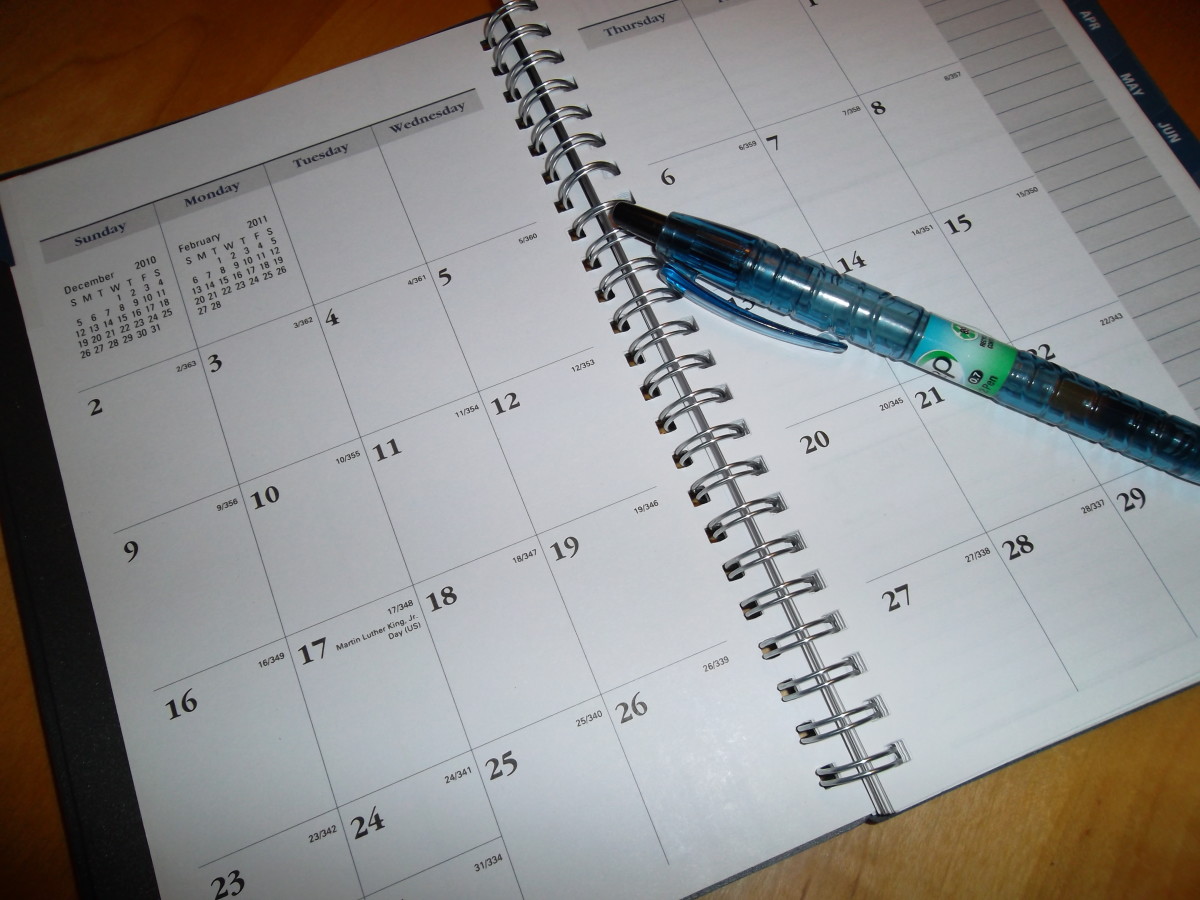Tips on Being Organized in School: Organizing your Planner and More Tips

If you are about to start a new semester and are trying to be organized and stay ahead in your schoolwork, this article will help you set goals and stick to them.
Do you usually start out strong, getting all of your work done on time and keeping up with readings?
In the middle of the semester, do you get tired or lazy and tend to fall behind in your work?
This guide will show you how to stay organized and ahead in your studies while being able to maintain your social life. It explains how to buy and organize a planner, how to stay on track with assignments and never be surprised by any exams, quizzes, tests, essays, papers and readings. If you procrastinated and need help, scroll to the bottom where you will find tips on how to write an essay quickly.
Whether you are in middle school, high school or college, this article will help you maintain your strength throughout the semester and produce quality work that will get you the grade you deserve.

Did you write your assignments in your planner once you got your syllabi or as the assignments came up?
Have you used a planner for school in the past?
Buy a Planner
A Fresh Start: Beginning the New Semester Strong
Whether you scored well last semester, or you really got unorganized and have decided to at least try to stay on track, remember that this is a new semester and another chance to really pull up your GPA. (This guide is also very helpful for those who are beginning to feel the strain of school or "senioritis".)
How to Organize your Planner
Start by purchasing a planner. A planner is a calendar book that allows you to keep track of events, birthdays, and most importantly, your schoolwork. Once you have a planner, collect all of the syllabi (or semester schedules) from your classes and begin to write the homework, tests and papers in the appropriate dates.
HOMEWORK
Write your homework assignments on the day in which you will do the homework. For example, if you are assigned to read 15 pages of Jane Eyre by October 8th, you will write the following under the date October 7th:
ECLS 290: Read 25 pages of Jane Eyre (Due: 10/8)
The format above is as follows:
[CLASS]: [Assignment] (Due: [Date])
If you have an assignment that you will not be able to complete the night before it is due, use the same format and write it in the date which you will begin the assignment.
For big assignments, set goals for yourself and write them in the planner on the dates you plan to work on them. See the "Goals" section later in the article for more tips on completing large projects or assignments.
TESTS AND PAPERS
For tests and papers, you will want to write a reminder on the date that they are scheduled or due. The format I like to use is much like the following:
ECLS 290: Paper #1 (Jane Eyre) Due
Always put the class first so you know which one it is. It is also helpful to include which paper or test it is by indicating it with a number. If you see that Test #2 is due, you can look back to your first test and find out how to improve your score on the next one.
I also included the topic of the paper (or test) in parentheses because it makes it easy to remember the subject without having to look it up later.
Once you have written all of your assignments in your planner, you will be able to see when you will be busy and when you will have some free time in between major assignments and tests. You will have to set goals for yourself in order to manage your time properly.

Do you set goals for yourself regarding schoolwork?
Setting Goals and Studying
You may be wondering how organizing your planner and writing down all of your assignments helps you to stay on track during the semester. I am now going to outline how to set goals and make sure that you manage your time correctly.
Setting Goals
Now that you have all of your assignments laid out in your planner, you have the opportunity to plan out when you will begin working on these assignments as well as begin studying for tests and quizzes.
For major exams and tests, you will probably want to begin studying about a week before they are scheduled. Remind yourself to study for them by putting a note in your planner a week before they are scheduled. If you require more or less time, put a reminder on the appropriate date. This method will keep you from being surprised by a paper or test.
For major assignments, projects, papers and presentations, set goals for yourself that can be easily completed. For example, if you have a paper due in two weeks, write different objectives in your planner on dates prior to the due date. Goals can include the following:
-
Write a thesis statement
-
Write a conclusion
-
Write the first/second/third section/body paragraph
-
Proofread frist draft
-
Write works cited or bibliography
-
Add footnotes
-
Edit for final draft
-
Print
By creating these different goals, you can easily write a paper without being overwhelmed with all of these objectives at once. By putting a single task on a certain day, you will be able to complete them much faster as well as make time to brainstorm for the next step. This method will also help you to consistently think about your paper, making it easier to write in the end because you have had your mind on it for days before it's due.
Making Time to Study
In the same way that you reminded yourself you work on papers and assignments, you can give yourself a reminder to study for a test, quiz or exam. A week or a couple of days before the test, make goals to study parts of the information you need to know. You can divide your study sections by the following:
- Chapters
- Books
- Subjects
- Time Periods
- Weeks (what you studied each week in the class)
By separating your study topics into days and sections, you will be able to give yourself more time to retain the information and organize it by subject in your head. Be sure to write them in your planner to keep you up-to-date and never surprised.
HELP! I HAVE ALREADY PROCRASTINATED!
If you already fell behind and need to finish a paper fast, you can read this article, which explains how to complete a paper quickly:
- How to Write an Essay Fast: A Solution to Procrastin...
This article will teach you how to finish writing your paper as soon as possible. It will help you write a thesis, conclusion, outline without having to spend hours thinking about what comes next.









